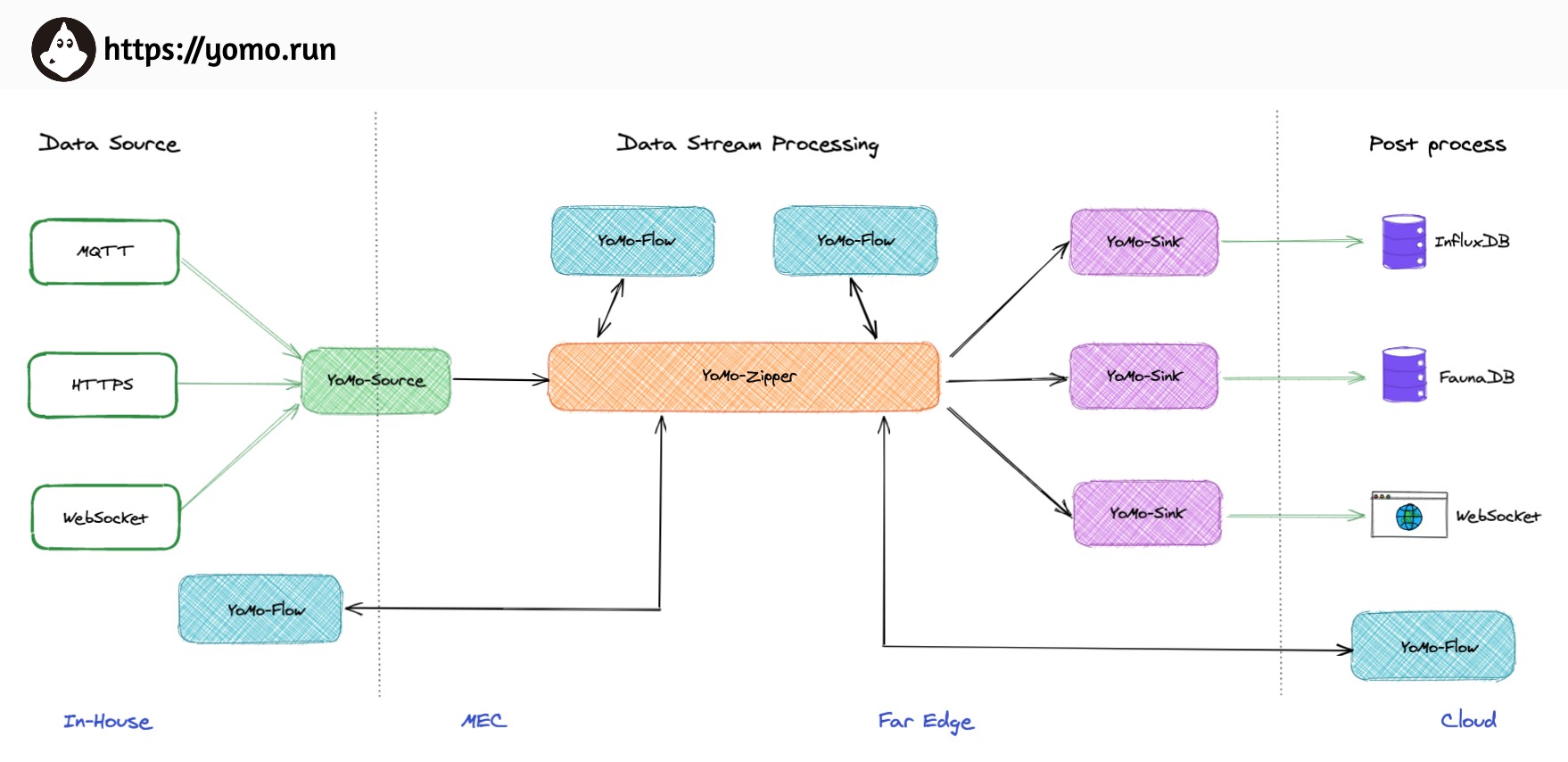YoMo 


YoMo is an open-source Streaming Serverless Framework for building Low-latency Geo-Distributed System. Built atop QUIC Transport Protocol and Functional Reactive Programming interface, it makes real-time collaborative applications reliable, secure, and easy.
Read the docs:
It’s no secret that today’s users want instant gratification, every productivity
application is more powerful when it's collaborative. But, currently, when we
talk about distribution, it represents distribution in data center. API is
far away from their users from all over the world.
If an application can be deployed anywhere close to their end users, solve the problem, this is Geo-distributed System Architecture:
🌶 Features
| Features | |
|---|---|
| Low-latency Guaranteed by implementing atop QUIC QUIC | |
| Security TLS v1.3 on every data packet by design | |
| 5G/WiFi-6 Reliable networking in Cellular/Wireless | |
| Geo-Distributed Edge Mesh Edge-Mesh Native architecture makes your services close to end users | |
| Event-First Architecture leverages serverless service to be event driven and elastic | |
| Streaming Serverless Write only a few lines of code to build applications and microservices | |
| Y3 a faster than real-time codec | |
| Reactive stream processing based on Rx |
🚀 Getting Started
Prerequisite
Step 1. Install CLI
curl -fsSL https://get.yomo.run | shVerify if the CLI was installed successfully
yomo versionStep 2. Init your first stream function, in WebAssembly way
In this demo, we will create a go project observing a data stream and count bytes received.
yomo init try-yomoThe yomo CLI will generate codes in folder try-yomo.
Step 3. Build
This Stream Function is written in Go, before compiling to WebAssembly, you need to install tinygo first.
$ yomo build app.go
ℹ️ YoMo Stream Function file: app.go
⌛ YoMo Stream Function building...
✅ Success! YoMo Stream Function build.Now, we get the sfn.wasm file, only 190K bytes.
$ exa -l
.rw-r--r-- 359 fanweixiao 14 Apr 01:02 app.go
.rwxr-xr-x 190k fanweixiao 14 Apr 01:08 sfn.wasmNote: you can implement Stream Function in Rust, Zig, C or other languages can be compiled to WebAssembly, more examples can be found at example/7-wasm/sfn.
Step 4. Run
There is an public test Zipper service tap.yomo.dev:9140 which is provided by
our community, you can test your StreamFunction quickly by connecting to it.
$ yomo dev sfn.wasm
ℹ️ YoMo Stream Function file: sfn.wasm
⌛ Create YoMo Stream Function instance...
ℹ️ Starting YoMo Stream Function instance with executable file: sfn.wasm. Zipper: [tap.yomo.dev:9140].
ℹ️ YoMo Stream Function is running...
time=2023-04-14T00:05:25.073+08:00 level=INFO msg="use credential" component="Stream Function" client_id=7IwpRofCpPp-AcVV2qUFc client_name=yomo-app-demo credential_name=none
time=2023-04-14T00:05:26.297+08:00 level=INFO msg="connected to zipper" component="Stream Function" client_id=7IwpRofCpPp-AcVV2qUFc client_name=yomo-app-demo zipper_addr=tap.yomo.dev:9140
sfn received 57 bytes
sfn received 59 bytes
sfn received 59 bytes
sfn received 59 bytes
sfn received 58 bytes
sfn received 59 bytes
sfn received 58 bytes
sfn received 59 bytes
sfn received 58 bytes
^CIt works!
Note:
yomo dev sfn.wasmis more convinient for development, it will connect totap.yomo.dev:9140automatically. It's a shortcut ofyomo run -z tap.yomo.dev:9140 -n yomo-app-demo.
There are many other examples that can help reduce the learning curve:
- 0-basic: Write Stream Function in pure golang.
- 1-pipeline: Unix Pipeline over Cloud.
- 2-iopipe: Unix Pipeline over Cloud.
- 3-multi-sfn: Write programs that do one thing and do it well. Write programs to work together. -- Doug Mcllroy
- 4-cascading-zipper: Flexible adjustment of sfn deployment and run locations.
- 5-backflow
- 6-mesh: Demonstrate how to put your serverless closer to end-user.
- 7-wasm: Implement Stream Function by WebAssembly in
c,go,rustand even zig. - 8-deno: Demonstrate how to write Stream Function with TypeScript and deno.
- 9-cli: Implement Stream Function in Rx way.
Read more about YoMo at yomo.run/docs.
🧩 Interop
Metaverse Workplace (Virtual Office) with YoMo
Sources
Stream Functions
Output Connectors
- Connect to FaunaDB to store post-processed result the serverless way
- Connect to InfluxDB to store post-processed result
- Connect to TDEngine to store post-processed result
🗺 Location Insensitive Deployment
📚 Documentation
YoMo-Source: docs.yomo.run/sourceYoMo-Stream-Function: docs.yomo.run/stream-functionYoMo-Zipper: docs.yomo.run/zipperFaster than real-time codec: Y3
YoMo
🎯 Focuses on computings out of data center
- IoT/IIoT/AIoT
- Latency-sensitive applications.
- Networking situation with packet loss or high latency.
- Handling continuous high frequency generated data with stream-processing.
- Building Complex systems with Streaming-Serverless architecture.
🌟 Why YoMo
- Based on QUIC (Quick UDP Internet Connection) protocol for data transmission, which uses the User Datagram Protocol (UDP) as its basis instead of the Transmission Control Protocol (TCP); significantly improves the stability and throughput of data transmission. Especially for cellular networks like 5G.
- A self-developed
y3-codecoptimizes decoding performance. For more information, visit its own repository on GitHub. - Based on stream computing, which improves speed and accuracy when dealing with data handling and analysis; simplifies the complexity of stream-oriented programming.
- Secure-by-default from transport protocol.
🦸 Contributing
First off, thank you for considering making contributions. It's people like you that make YoMo better. There are many ways in which you can participate in the project, for example:
- File a bug report. Be sure to include information like what version of YoMo you are using, what your operating system is, and steps to recreate the bug.
- Suggest a new feature.
- Read our contributing guidelines to learn about what types of contributions we are looking for.
- We have also adopted a code of conduct that we expect project participants to adhere to.
🤹🏻♀️ Feedback
Any questions or good ideas, please feel free to come to our Discussion. Any feedback would be greatly appreciated!
🏄♂️ Best Practice in Production
Discussion #314 Tips: YoMo/QUIC Server Performance Tuning



